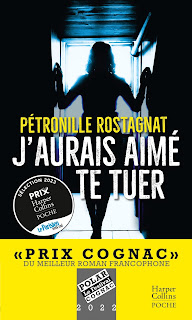J'aurais aimé te tuer - Pétronille Rostagnat
Commander Damien Deguire of the Crim' de Versailles (brigade criminelle) is certainly challenged with a unique situation when Laura Turrel presents herself at the police station claiming to have killed a man, Bruno Delaunay. A waitress at a local restaurant, Laura had also been working part-time as a cleaner for Delaunay, who was one of its regular customers. She claims that when the man made aggressive sexual advances she whacked him over the head with an iron and burned his body. After disposing of the remains she then used his car and bank cards to prevent anyone reporting him missing. Something about her story however does not add up, and indeed an initial investigation of the house and extensive grounds of Delauney's property show little evidence that backs up her story, not least of which is no sign of blood or a body.
While it looks like the police have been sent on a wild goose chase, the harder question to figure out is why. From a few brief insights into Laura's time in custody, the reader at least knows that she certainly has some kind of longer-term aim and is directing or controlling the police investigation with false leads. The police aren't duped either but have to work around what they have been given and what they haven't been given; namely a body. Some background investigation into Delauney is sure to reveal something, and perhaps that is ultimately the aim of Laura, but why such extreme measures that involves her being locked up while the case is investigated?
Well, the Conditional tense of title (I would have loved to kill you) bears an indication that the case and Laura's intentions are anything but straightforward. In fact, this is not at all a traditional thriller or murder mystery that puts forward a crime at the outset and seeks to reveal its mysteries, since the tense indicates are that no-one is dead. Or not yet, anyway. Laura is playing with the police, confessing to a crime that doesn't yet have a body, risking imprisonment before she has carried out her crime. It's clearly some part of her plan in some way, and that's what is going to keep you reading to find out. J'aurais aimé te tuer then is more of a suspense thriller where, the police are investigating a crime that is still in the process of being enacted. That's an interesting premise, but it's not the whole story either.
It may be a good premise but everything rests on how it is resolved. Either there is going to be a terrific payoff or a big let down. As a winner of the Prix Cognac for best French language thriller, that at least gives you reason not to expect to be disappointed, but the progress of the case is surprisingly not all that compelling. The characterisation is somewhat bland and lacking on Commander Deguire's side, and although Laura Turrel's background and the enigma of what she is doing does fall into place, it does seem to be bogged down in a Machiavellian plot that requires too many unexpected variables to fall into place at the right time to work out convincingly. Whether the perfect crime is achieved however you will have to read that to find out for yourself.
If J'aurais aimé te tuer is to succeeds to any degree, it could depend on whether you accept that a crime (whether murder or not) against of a rapist is morally justifiable. Clearly the jury of the Prix Cognac were convinced, but I'm less inclined to buy into this. There is a case to be made, but for me, Rostagnat doesn't quite deliver the character or the passion needed to get you onside with Laura's actions. I'm still unclear on the rationale and expected outcome of Laura confessing and being put in custody in the first instance, and I'm afraid there is at least one unconvincing and out-of-character twist too many for me at the conclusion, which feels more like an obligatory novelistic thriller convention than something naturally arising out of the circumstances.
Reading notes: The paperback of J'aurais aimé te tuer by Pétronille Rostagnat is published in France by Harper Collins Poche. It's the author's sixth novel. The biographical information notes that Pétronille Rostagnat worked for ten years in marketing in Shanghai before moving to Lyon and becoming a writer in 2015. I actually picked the just-published paperback edition as it caught my eye while on a visit to Lyon.




Comments
Post a Comment